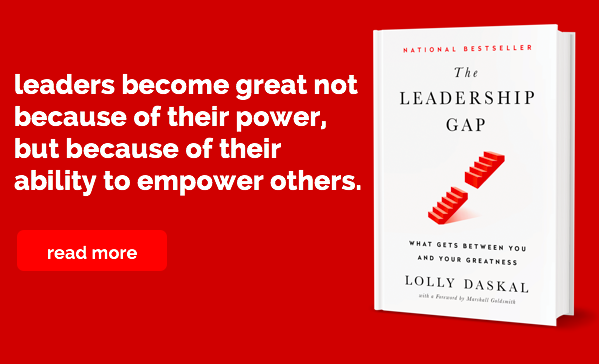
The other day I sat down with a capable and competent leader. But in spite of her abilities and accomplishments, she didn’t see herself as a leader. Her beliefs about herself were holding her back and destroying her leadership.
I asked her to tell me about those beliefs so we could see what was limiting her. Her responses, repeated below, mirror the thoughts of every self-undermining leader I’ve ever worked with.
How many of these beliefs do you hold?
I wasn’t born a leader. Many people believe that to be a great leader you have to be born with certain innate qualities and abilities. The truth: great leadership can be developed and learned by anyone with the willingness and desire to lead.
I don’t have the title or position to lead. Even in an age where hierarchy is less important, many people still believe that to make a difference and be a great leader you need an impressive title. Of course, one has nothing to do with each other—you can lead in any position and from wherever you are, whether you’re a CEO, a line worker, a volunteer, or even an involved neighbor.
I’m waiting for the right opportunity to lead. If you’re waiting to find yourself in the circumstances of a leader, you might be waiting for a long time. Leadership isn’t something that happens to you but something you do. Leaders show up and start leading wherever and whenever they are needed.
I need more experience to lead. I’ve met lots of people who are absolutely capable and competent to lead, but they’re wasting their gifts by waiting to mature and have years of experience behind them instead of seizing the moment. Leaders bring value to whatever they do, wherever they are.
After listening to what she had to say, I worked on giving her a new vision of herself, one in which the leader she could become was already within her and all she needed to do was embrace it.
Our belief system is based on how we view the world. Many of the beliefs we cultivate about life date back to childhood, ingrained in us by our parents and other influential adults.
Most of the time, these beliefs serve us well up to a certain point. But eventually some of them become limiting and perhaps even damaging. In adulthood, the beliefs we created as a child no longer work for us as well as they did in the past; they may even end up hurting us.
Too often, though, we automatically accept the things we were taught to believe without questioning. We lose the ability to decipher genuine beliefs from those that are false. And our false beliefs become real when we give them power.
If your beliefs are interfering with your leadership growth, it’s time to change your thinking.
That means rewiring and rewriting the beliefs that are holding you back. Don’t allow your thoughts to tell you that who you are, is not enough or that what you know is deficient or wrong.
We need to constantly be looking inward, observing our own thoughts and transforming our false beliefs about ourselves into positive affirmations.
Lead from Within: The only way you can begin to embrace who you are meant to be is to stop living on autopilot as a prisoner to your own mind, that is filled with false beliefs.
N A T I O N A L B E S T S E L L E R
Additional Reading you might enjoy:
- 12 Successful Leadership Principles That Never Grow Old
- A Leadership Manifesto: A Guide To Greatness
- How to Succeed as A New Leader
- 12 of The Most Common Lies Leaders Tell Themselves
- 4 Proven Reasons Why Intuitive Leaders Make Great Leaders
- The One Quality Every Leader Needs To Succeed
- The Deception Trap of Leadership
Photo Credit: Getty Images
Of Lolly’s many awards and accolades, Lolly was designated a Top-50 Leadership and Management Expert by Inc. magazine. Huffington Post honored Lolly with the title of The Most Inspiring Woman in the World. Her writing has appeared in HBR, Inc.com, Fast Company (Ask The Expert), Huffington Post, and Psychology Today, and others. Her newest book, The Leadership Gap: What Gets Between You and Your Greatness has become a national bestseller.

Abel Jimenez
27. Mar, 2018
Enlighting article. The belief system is dependent on how you see the world, and also how you see yourself. Both views interplay and materialize as how we think. Thinking drives emotions, behavior and other important visible realities.
Joe Truss
27. Mar, 2018
Lolly, well said. As a teacher who became a school leader, I was always looking for opportunities to develop, practice, and step up. In inner city public schools, there is plenty work to be done. I developed a list of “12 secrets for moving from Teacher to Leader.” Check it out and let me know if you see any connections with your field. http://culturallyresponsiveleadership.com/12-secrets-for-teacher-leaders